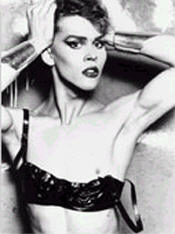 |
|
Rebels, Rubyfruit and Rhinestones: Queering Space in the Stonewall South; by James T. Sears; Rutgers University Press; 440 pages; $28.00 (Available in local bookstores after August 24)
This current volume takes the queer South past Stonewall and into an age of gay liberation and lesbian feminism. In the decade between 1969 and 1979, Professor Sears writes, "the homophile generation marked by gradualism, civility, and accommodation gave way to the rubyfruit generation characterized by immediacy, confrontation, and resoluteness. In the span of a generation we went from long lines to view Boys in the Band to picket lines for those viewing Cruising, from lonely voices seeking political support to powerful voices wielding political clout, from women's auxiliaries in gay male organizations to the radicalesbians of the Furies, Feminary, and Sinister Wisdom." (Full disclosure: Professor Sears interviewed me for this book; and my own story is part of Rebels, Rubyfruit, and Rhinestones.) Though Lonely Hunters covered a period that is twice as long as its successor's, its geographic scope was limited to Florida and the Carolinas. Rebels, Rubyfruit., and Rhinestones' range is as big as the Southland, and includes Houston, New Orleans, Birmingham, rural Tennessee, Richmond and Norfolk as well as Miami, Charleston and Charlotte. And while Lonely Hunters was rightly criticized for its heavy male emphasis, RRR gives Dixie's lesbians their due.
To a large extent, the lesbian and gay history of the South is the history of ordinary women and men who were moved by circumstances to do extraordinary things. What they would have done without the double impetus of the gay and feminist movements we can only surmise. Though Bob Basker, Logan Carter or Julia Penelope would have been notable under almost any circumstances, it was their presence at a particular place and time that made them great, and memorable. Basker, as we should all know, played a pivotal role in Miami-Dade County's ill-fated "gay rights" referendum (1977). This election, and the rise of Anita Bryant as a symbol of the religious right, are the most memorable events of the gay South in the 1970's. Though Sears gives them their due, he also introduces the reader to other, lesser-known but equally important milestones, from the fire that killed 28 men and 1 woman at the Up Stairs Lounge in New Orleans in 1973 to the National Women's Conference in Houston in 1977.
Rebels, Rubyfruit, and Rhinestones naturally ends with the first March on Washington for Lesbian and Gay Rights (October 13, 1979); a "gathering of tribes" which brought together many of the book's major and minor "characters". Though the March, like Pride celebrations before or since, gave us a semblance of unity, it could not mask "profound differences" based on gender, race, class, lifestyle or politics. Many women agreed with Julia Penelope, who did not attend the March and who had long left the mostly-male gay movement for lesbian separatism. People of color, who gathered that weekend for the Third World Conference of Lesbians and Gays, continued to face racism in both the gay and non-gay white communities. Meanwhile, by 1979 activists "with roots in gay liberation and revolutionary visions" had been replaced by "a new generation of leaders dedicated to advancing the gay agenda within the system." Twenty-two years later, none of the goals of the March on Washington have been accomplished. The South, which now dominates the U.S. body politic, still frowns upon its sexual minorities. Sodomy laws remain on the books and the "old time religion" that Anita Bryant represented is still a major force in the Bible Belt. But we cannot discount what the rubyfruit generation accomplished. Thanks to the likes of Pokey Anderson, Bob Basker, Mel Boozer, Logan Carter, Lige Clarke, Vicki Gabriner, Ray Hill, Leonard Matlovich, Merril Mushroom, Jack Nichols, Fred Paez and Julia Penelope, young lesbian, gay, bisexual and transgender Southerners (and others) have a community to turn to, and role models to emulate. And thanks to James Sears and Rebels, Rubyfruit, and Rhinestones, their lives and their achievements are now part of our permanent record.
|


 Rebels, Rubyfruit, and Rhinestones is the second volume in James T.
Sears's multi-volume history of the lesbian and gay South. The first volume,
Lonely Hunters, covered the period between 1948 and 1968, when the closet was
still king and the homophile movement first raised a cautious head.
Rebels, Rubyfruit, and Rhinestones is the second volume in James T.
Sears's multi-volume history of the lesbian and gay South. The first volume,
Lonely Hunters, covered the period between 1948 and 1968, when the closet was
still king and the homophile movement first raised a cautious head.
 Roxanne Russell a.k.a. Logan Carter
Roxanne Russell a.k.a. Logan Carter  Jesse Monteagudo is a freelance writer who lives in South Florida with
his domestic partner. He can be reached at
Jesse Monteagudo is a freelance writer who lives in South Florida with
his domestic partner. He can be reached at